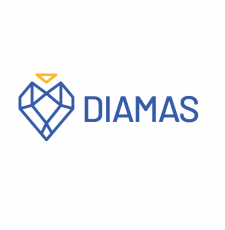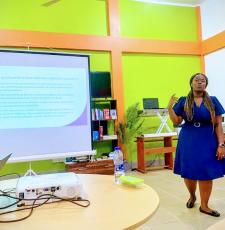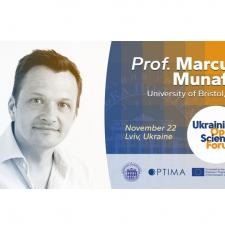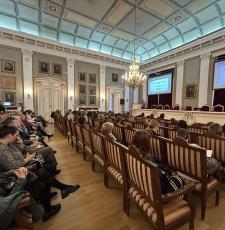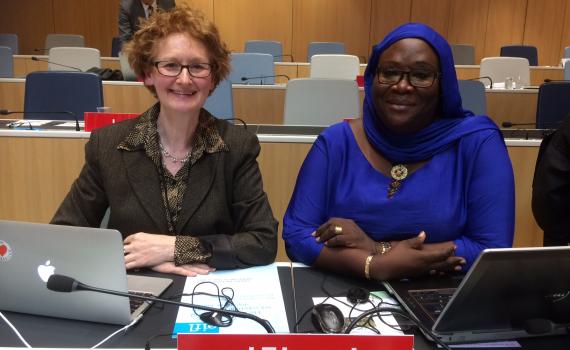
EIFL had two experienced representatives at the World Intellectual Property Organization’s (WIPO) Standing Committee on Copyright and Related Rights (SCCR/34) which met in Geneva from 1-5 May 2017. Teresa Hackett, Copyright and Libraries Programme Manager and Awa Cissé, EIFL’s Copyright Coordinator in Senegal were on the ground promoting library interests to member state delegates, working closely with our international partners and seeking progress on library copyright issues at WIPO.
NEW LEADERSHIP
WIPO’s Standing Committee on Copyright and Related Rights (SCCR), that meets twice a year in Geneva, kicked off its first session of 2017 with the election of three new officers. Mr Daren Tang Heng Shim (Singapore) was elected as Chair, Mr Karol Kościński (Poland) and Mr Abdoul Aziz Dieng (Senegal) were elected as Vice-Chairs. They will serve for five SCCRs in total (SCCR/34 to SCCR/38).
In opening remarks, Mr Tang commented on the importance of SCCR’s work because copyright impacts on the lives of every citizen, for example, through watching a video on YouTube or accessing music, setting copyright apart from other areas of IP law. It also impacts on many different stakeholder groups.
Mr Kościński remarked that while he comes from a country that is a member of the European Union, at the same time, Poland is a country in transition with its own experiences and needs. As copyright can be perceived from different perspectives, a balance is therefore necessary.
EIFL joined in applause for the outgoing SCCR Chair, Mr Martin Moscoso of Peru, and Vice-Chair, Mr Santiago Cevallos of Ecuador, for advancing the work of the Committee over the last years.
THREE OUTCOMES FOR LIBRARIES
At the end of a busy week, three concrete outcomes were agreed by member states concerning libraries and archives.
First, the Committee requested the Secretariat to draw up a draft action plan for limitations and exceptions for libraries and archives for discussion and consideration of its adoption at the next SCCR session in November 2017. This is important because it would give the Committee direction on its future work on libraries and archives.
Second, the Committee agreed to update the study on limitations and exceptions for libraries and archives prepared by international copyright expert, Prof Kenneth D. Crews. The original study, that brings together library copyright statutes from the around the world, is an excellent resource. Since the latest update will be its fourth iteration (the study was first published in 2008 and updated in 2014 and 2015), it is increasingly useful in identifying trends in the development of library copyright statutes, and to gauge the all-important pace of change i.e. how well is copyright law keeping up with technological developments?
Third, the so-called Chair’s informal chart, used as the basis for discussion on libraries and archives over the last two years, was allocated a document number - SCCR/34/5 – thus ensuring its place as an official document (that we wish to see adopted by the Committee). The chart, that contains 11 topics, such as preservation and research copies, sets out the Principle, Concern and Suggested Approach for each topic. It helps to identify priorities for the topics, and since considerable work has already gone into it, it’s a solid basis for future work.
FIXING COPYRIGHT FOR MODERN EDUCATION
 Apart from discussions in plenary, there are opportunities to organize events on the sidelines of WIPO SCCR meetings.
Apart from discussions in plenary, there are opportunities to organize events on the sidelines of WIPO SCCR meetings.
EIFL co-organized a lunch-time event for delegates, entitled ‘Fixing Copyright for Modern Education’, with Communia, Creative Commons and the American University Washington College of Law.
The event, the first such side event on education organized by civil society at SCCR, provided an overview of legal trends and developments concerning education. It began with remarks by Ms Chichi Umesi, Counsellor at the Mission Of Nigeria to the United Nations in Geneva, on the importance of education for developing countries. (The African Group has made proposals in favour of education, as well as libraries and archives at SCCR).
Panelists from Australia, India and Portugal described legal challenges faced by educators using new technologies, presented recent data on obstacles and discussed how copyright limitations and exceptions can be adapted for education in the digital age.
The panel was moderated by Sean Flynn, Program on Information Justice and Intellectual Property, American University Washington College of Law.
Presentations and background material are available here.
The side event supported the agenda item on education that included in this SCCR a status update on the study by Prof Daniel Seng on copyright limitations and exceptions for educational activities.
In addition, the scoping study on limitations and exceptions for persons with disabilities (other than print disabilities) was presented by Prof Caroline Ncube, University of Cape Town, and Blake Reid, University of Colorado Boulder.
Both completed studies (education and other disabilities) will be presented at SCCR/35.
COPYRIGHT IN THE DIGITAL ENVIRONMENT, ARTIST’S RESALE RIGHT AND BROADCASTING
Three other topics were discussed during this SCCR – analysis of copyright in the digital environment, artist’s resale right and the protection of broadcasting organizations.
On broadcasting, a new version of the draft treaty text on the protection of broadcasting organizations was agreed. EIFL has concerns with the text: limitations and exceptions must be strengthened to protect the public interest, and the over-broad scope of protection will lead to over-long terms of protection (concerns expressed also by the United States). Unfortunately NGOs did not get an opportunity to speak this time on broadcasting.
On the analysis of copyright in the digital environment (proposed by the Group of Latin American and Caribbean Countries (GRULAC)), EIFL did get a chance to comment on a presentation of a scoping study by invited experts Dr Guilda Rostama and Professor Pierre Sirinelli. EIFL asked whether the experts will consider the evidence and examples of problems experienced by libraries and archives working with digital content, as presented to SCCR, in their review of copyright laws for digital uses.
On artist’s resale right - royalty payments to creators when their works are re-sold on the market - (proposed by Senegal and Congo), WIPO organized an international conference on the Friday preceding SCCR. Presentations at the conference included the international development of the art market, a study on the resale right, management of the resale right, and the importance of the resale right for artists.
Requests for the adoption of both topics, analysis of copyright related to the digital environment and resale right, as separate items on the agenda of the SCCR were not taken up so they remain under ‘Other matters’ on the agenda.
WIPO ASSEMBLIES 2017
Since this was the last SCCR before the WIPO Assemblies (that take place this year from 2 -11 October), it was the last opportunity to prepare any items to go forward to the Assemblies for decision in 2017.
Although it could have been on the cards at this session, the Committee did not recommend the convening of a diplomatic conference on broadcasting. Instead broadcasting will be maintained on the agenda of the next SCCR, along with limitations and exceptions for libraries and archives, education and persons with other disabilities, and other matters.
Full details are in the Summary by the Chair, which is available here.
FIND OUT MORE
- Statements by EIFL at SCCR/34 - Agenda item 7: Limitations and exceptions for libraries and archives and Agenda item 9: Other matters Proposal for Analysis of Copyright Related to the Digital Environment.
- Webcast SCCR/34. For Agenda item 7, Limitations and Exceptions for Libraries & Archives go to Wed 3 – English morning. NGO statements start at 48:40 (EIFL’s statement is at 1:09:10)
- Twitter hashtag #sccr34
SHARE / PRINT






